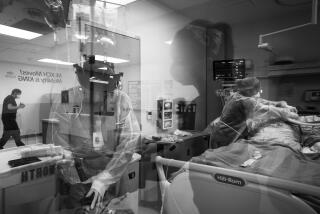Secondhand Smoke Increases Health Risk, Study Finds
WASHINGTON — High exposure to secondhand smoke nearly doubles a woman’s risk of having a heart attack, according to the largest study ever conducted on the issue.
The study, being published today, provides strong new evidence supporting the hotly disputed claim that secondhand smoke poses a major health risk, and could play an important role in the first class-action lawsuit against tobacco companies over secondhand smoke, which is scheduled to begin in Florida on June 2.
Researchers asked 32,000 nurses in a large ongoing study to place themselves in one of three categories: no exposure to secondhand smoke, occasional exposure, and regular exposure. The researchers then monitored the nurses’ health during the 10 years between 1982 and 1992, and found evidence of chronic heart disease in 152 cases, including 25 fatal heart attacks.
The researchers estimated the relative risks of coronary heart disease for those claiming regular exposure to secondhand smoke at 1.91 times that of women not exposed to tobacco smoke at home or work. Women claiming occasional exposure were 1.58 times more likely to suffer from heart disease than those not exposed.
The results “suggest that regular exposure to passive smoking at home or work increases the risk of [heart disease] among nonsmoking women,” wrote Ichiro Kawachi of the Harvard Medical School and his colleagues in reporting the findings in the journal Circulation, which is published by the American Heart Assn.
“It’s really a superb piece of work,” said Stanton Glantz, a UC San Francisco researcher and anti-tobacco activist. Glantz said the research was “probably the best study to date” on the issue. “It’s another important link in the whole chain of evidence” linking passive smoking to serious illness, Glantz said.
Walker Merryman, a spokesman for the Tobacco Institute, said that he could not comment until he had read the study.
Earlier research has shown that secondhand smoke increases the risk of lung cancer, though the amount of that risk is still in dispute.
In a highly controversial report, the Environmental Protection Agency estimated that passive smoking causes 3,000 lung cancer deaths each year and respiratory problems for children. The EPA research did not, however, evaluate the impact of passive smoking on heart disease.
Previous studies have suggested a link between secondhand smoke and heart disease, but the new study is by far the largest to evaluate the question.
By the standards of epidemiology, the increase in risk is not huge, said Raymond L. Woosley, chairman of the department of pharmacology at Georgetown University. Smoking, for example, increases the risks of cancer and heart disease many times over depending on how much a person smokes. But because there are so many millions of people exposed to large amounts of secondhand smoke, even relatively small increases in risk translate into large amounts of illness and death.
Kawachi estimated that his research would translate into as many as 60,000 deaths each year in the United States attributable to secondhand smoke. “Any estimate for the cost of passive smoking is likely to be underestimated by tenfold if you’re going simply by lung cancer costs,” Kawachi said.
The data were drawn from the Nurses Health Study, a long-term project run by the Brigham and Women’s Hospital and the Harvard School of Public Health in Boston that is considered one of the most reliable long-term epidemiological studies.
Kawachi said that, if anything, one could expect exposure to tobacco smoke to have dropped as more towns and companies enforce indoor smoking bans, and so the study would underreport the health risks.






